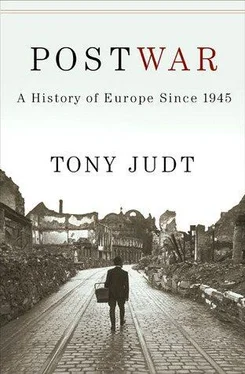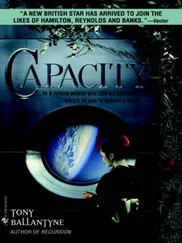The interpretation of that last phrase would prove, to say the least, contentious. But in 1945 the Americans and British were not disposed to give Stalin an argument on the matter. The Soviets had earned, it was felt, the privilege of defining their security as they saw fit; just as it was initially agreed that Moscow was within its rights to extract reparations, booty, labour and materiel from former Axis countries (Germany, Austria, Hungary, Romania, Bulgaria and Finland). Looking back, we may be tempted to see in these territorial seizures and economic spoliation the first stages of the bolshevization of Europe’s eastern half, and so of course they proved. But at the time this was not obvious to everyone—to Western observers there was even something familiar and reassuringly traditional about Moscow’s initial post-war stance. [28] In Poland, of course, it was anything but reassuring—just because it was so familiar.
And there was a precedent.
Overall, it is not possible to understand the Communist regime in Russia unless we take seriously its ideological claims and ambitions. But there were moments, and the years 1945-47 are one of them, when even if one knew little of Bolshevik doctrine it would be possible to make reasonably good sense of Soviet foreign policy simply by looking to the policies of the czars. It was Peter the Great, after all, who introduced the strategy by which Russia would dominate through ‘protection’ of its neighbours. It was Catherine the Great who drove the Empire forward to the south and south-west. And it was Czar Alexander I, above all, who established the template for Russian imperial engagement in Europe.
At the Vienna Congress of 1815, where—as in 1945—the victorious and mutually suspicious allied powers met to re-establish continental equilibrium following the defeat of a tyrant, Alexander’s purposes had been quite explicit. The concerns of small nations were to be subordinated to those of the Great Powers. Since British interests lay overseas and no other continental power matched that of Russia, the Czar would serve as arbiter of a post-war continental arrangement. Local protests would be treated as threats to the arrangement at large and put down with appropriate energy. Russian security would be defined by the territory under Czarist control—never again must a Western army be able to reach Moscow unimpeded—and by the success with which its occupants were forcibly reconciled to the new system.
There is nothing in that account which does not apply to Soviet calculations in 1945. Indeed, Alexander and his ministers would have seen nothing with which to cavil in a policy memorandum written by Ivan Maisky, the Deputy People’s Commissar for Foreign Affairs, in November 1944: ‘The most advantageous situation for us would be the existence in Europe after the war of only one mighty continental power—the USSR, and one mighty maritime power—Britain.’ Of course, at a distance of 130 years nothing is ever quite the same: in 1945 Stalin was more concerned with Central Asia and the Near East than Alexander had been (though Alexander’s immediate successors were very active there); conversely, Soviet strategists did not fully share the Czarist obsession with Constantinople, the Straits and the south Balkans. But the continuities of policy far outweigh the differences. They are linked, as it were, by the calculations of Sazunov (Russia’s foreign minister on the outbreak of war in 1914), who was already envisaging the future of eastern Europe as a cluster of small, vulnerable, states; nominally independent but effectively clients of Great Russia.
To these enduring themes of Czarist foreign policy in Europe, Stalin added distinctive calculations of his own. He truly expected the coming economic collapse of the West—extrapolating from inter-war precedent as well as Marxist dogma—and he exaggerated the ‘inevitable’ conflict between Britain and the US as imperial competitors for a shrinking world market. From this he deduced not just a coming time of increased turbulence—and thus the need for the Soviet Union to nail down its gains—but the real possibility of ‘splitting’ the Western allies: over the Middle East especially but perhaps over Germany as well. That was one reason why he evinced no haste in reaching a settlement there—time, Stalin believed, was on his side.
But this did not make him any more secure. On the contrary, defensiveness and a wary suspicion characterized all aspects of Soviet foreign policy—‘the Kremlin’s neurotic view of world affairs’ as George Kennan described it in 1946. Hence the famous February 9th 1946 speech at the Bolshoi Theatre, where Stalin announced that the Soviet Union was returning to its pre-war emphasis on industrialization, war-preparedness, and the inevitability of conflict between capitalism and Communism, and made explicit what was already obvious, that henceforth the Soviet Union would cooperate with the West only when it suited her.
There was nothing new here: Stalin was retreating to the ‘hard’ line taken by the Bolsheviks before 1921 and again between 1927 and the onset of the Popular Fronts. The Bolshevik regime had always been insecure—it was born, after all, of a minority coup in unpropitious circumstances and a highly unsympathetic environment—and Stalin, like all tyrants, needed to invoke threats and enemies, whether domestic or foreign. Moreover Stalin knew better than most that World War Two had been a close run thing: if the Germans had invaded a month earlier in 1941 (as Hitler’s original schedule required) the Soviet Union might very well have folded. Like the USA after Pearl Harbor, but with rather better cause, the Soviet leadership was obsessed to the point of paranoia with ‘surprise attacks’ and challenges to its new-won standing. And the Russians (even more than the French) continued for many decades to see Germany as the main threat. [29] In 1990 Edvard Shevardnadze, the Soviet Foreign Secretary, reportedly observed that despite a forty-year-long Cold War with the United States, when his grandchildren played war games, Germany was still the enemy.
What, then, did Stalin want? That he anticipated a coming cooling of relations with the West and was out to make the best of his assets and take advantage of Western weakness is doubtless true. But it is far from obvious that Stalin had any clear strategy beyond that. As Norman Naimark, the historian of the Soviet occupation of post-war East Germany, concludes, ‘The Soviets were driven by concrete events in the zone, rather than by preconceived plans or ideological imperatives’. This fits with what we know of Stalin’s general approach, and it applies beyond the East German case as well.
The Soviets were certainly not planning for World War Three in the near term. Between June 1945 and the end of 1947 the Red Army was reduced from 11,365,000 personnel to 2,874,000—a rate of cutback comparable to that in US and British forces (though leaving a far larger contingent still in the field, comprising many well-armed, motorized divisions). Of course, Soviet calculations were by no means self-evident to western contemporaries, and even those who read Stalin as a cautious pragmatist could not be absolutely certain. However, Molotov is surely telling the truth when he suggests in his memoirs that the Soviet Union preferred to take advantage of propitious situations but was not going to take risks in order to bring them about: ‘Our ideology stands for offensive operations when possible, and if not, we wait.’
Stalin himself was famously risk-averse, which is why some commentators then and since regretted the West’s failure to exercise ‘containment’ sooner and further forward. But no-one wanted another war in these years, and whereas Stalin could readily be dissuaded from trying to destabilize Paris or Rome (since he had no armies there), the Soviet presence further east was a non-negotiable affair, as everyone recognized. In the Allied Control Councils in Bulgaria or Romania the Soviets did not even pretend to take note of British or American wishes, much less those of the locals. Only in Czechoslovakia was there a degree of ambiguity, the Red Army having long since withdrawn.
Читать дальше












